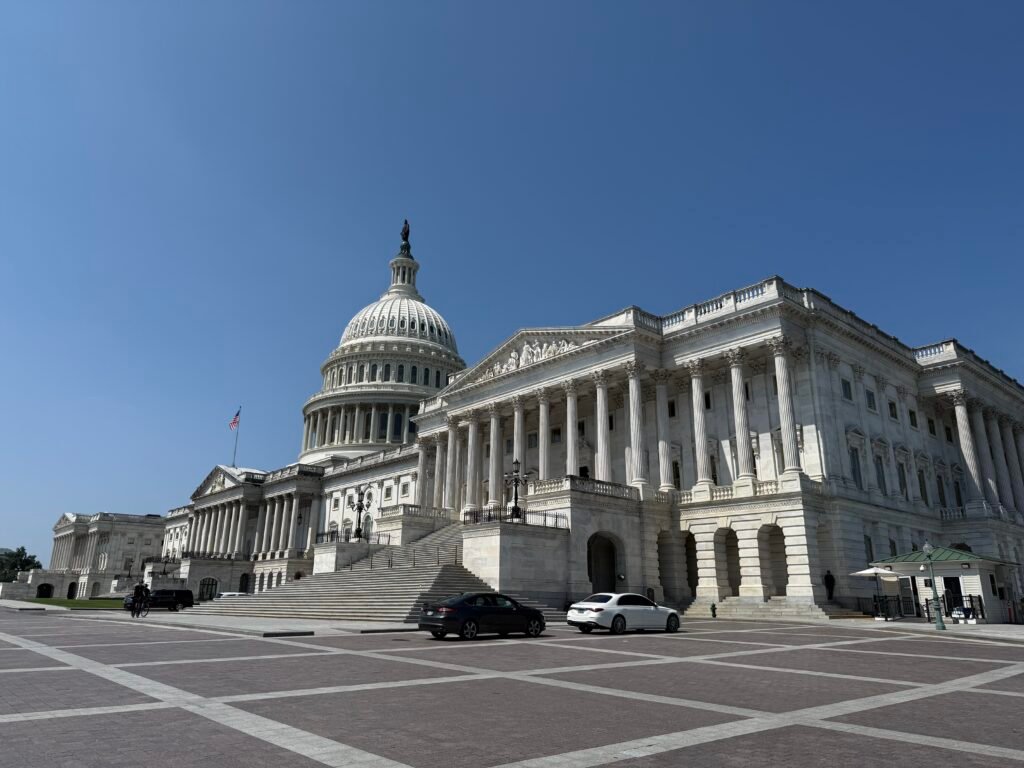Senate Debates Major Republican Bill
WASHINGTON – The US Senate kicked off discussions about a significant Republican bill on Sunday afternoon. However, there are several hurdles before it can become law, and each one has the potential to spark further opposition from GOP members.
To proceed, senators must adhere to strict rules regarding the legislative process, ensuring that they can navigate the ongoing review of the bill during what promises to be a lengthy voting session.
Modifications to the tax and spending reduction package—topics at the forefront of the debate—need the backing of nearly all Republicans for the bill to pass. If they don’t secure that support, the legislation may never see the light of day.
Senate Majority Leader John Thune hinted in a brief hallway interview that there could be enough votes to introduce new amendments concerning Medicaid. This would entail reducing federal spending on Medicaid in states that expanded their programs following the 2010 Democratic Health Act, where the government currently covers 90% of the costs for subscribers to the expansion.
“We’re doing our best to support these efforts,” Thune mentioned, referencing the amendments proposed by Florida Senator Rick Scott, although those specifics remain undisclosed. “It’s a solid policy, and there’s notable interest in our discussions to incorporate it, given its potential for savings.”
Yet, Thune refrained from addressing whether changes to the bill might complicate its approval process, potentially blocking it from reaching President Trump’s desk.
“We’ve had conversations with Speaker Mike Johnson and other leaders,” he shared. “This is how the bill was designed. Hopefully, Republicans will rally around what Senator Scott is aiming to achieve.”
“Once we approach the end, we’ll deal with it then. Clearly, we’re still in discussions and need to get through revisions. The fate of those revisions is something we’ll see on the floor,” he added.
As of now, 41 states including D.C. are implementing Medicaid expansion, according to healthcare research from KFF.
Adjustment in Progress
Typically, when significant legislation comes before the Senate, the texts are established beforehand, and the amendment discussions are tightly managed to prevent any last-minute collapses of negotiated provisions. However, this time it feels less certain, and many things could shift before a final vote is cast, expected later this week.
GOP leaders employing complex legislative maneuvers to push noteworthy policies through Congress must ensure that all provisions meaningfully impact federal spending or revenue that isn’t purely hypothetical.
This involves both parties discussing a multitude of provisions before the official Senate vote, determining whether specific policies comply with stringent, sometimes ambiguous, rules.
The debate over this substantial bill is expected to continue as the countdown to the voting session looms ahead.
Financial Implications
Concerns are mounting among Republicans, particularly within the House Freedom Caucus, regarding the bill’s anticipated impact on the federal deficit over the next ten years. The nonpartisan Congressional Budget Office revealed that the revised tax and spending reduction package could add over $3 trillion to the deficit.
Trump seems to be addressing these worries through social media, advising caution. “Remember, being re-elected is essential to manage costs effectively, so don’t go overboard! We’re thriving more than ever,” he stated.
This update comes just as the Senate initiated floor discussions around a comprehensive package linked to the 2017 GOP Tax Act, aiming to overhaul allocations for programs like supplemental nutrition assistance, some Medicaid aspects, and various higher education funding.
Although the law advanced late Saturday night, it took leaders over three hours of voting to gather the necessary support.
Following procedural steps, Congress will reference the new 940-page package.
Challenges Ahead
Republican senators might need to alter language intended to secure support from Alaska’s Senator Lisa Murkowski, as the bill doesn’t seem likely to incorporate that anymore. With a Democratic delegation representing Hawaii, Republican strategies might largely hinge on the two GOP senators from Alaska.
Recent rulings have offered some encouraging news for Senator Murkowski, as proposed language could reduce Medicaid provider tax rates gradually by 2032.
However, the policy continues to generate significant dissatisfaction among GOP senators, who argue that earlier versions could financially strain rural hospitals by initiating changes sooner.
Medicaid and Planned Parenthood Funds
Congress is also analyzing several other policy changes, including potential measures to prevent Medicaid funds from supporting Planned Parenthood for a year, which would restrict access to care for beneficiaries.
Current federal law already prohibits taxpayer dollars from being used for abortion services, barring limited exceptions. This new change could hinder Medicaid patients from utilizing Planned Parenthood for various healthcare needs, such as check-ups and cancer screenings.
Earlier iterations of the bill restricted federal funding for Planned Parenthood for a decade.
Senate Finance Committee Chairman Mike Crapo didn’t provide immediate comments on how this ruling could influence future legislation.
Meanwhile, Senator Ron Wyden criticized the latest GOP decisions, suggesting they complicate healthcare access for children and seniors. “Republicans seem intent on rolling back last year’s healthcare progress,” he stated, voicing disappointment over persistently unfavorable tax changes remaining in the bill.
Looking Ahead
Republicans aspire to pass the entire package by July 4, though several obstacles remain on the horizon.
Senate discussions can extend up to 20 hours, followed by a voting session for amendments, during which party members can propose changes or deletions to the legislation.
GOP leaders generally wish to avoid visible rifts within their party, but the legislative rules don’t allow for that, and several Republicans are poised to present amendments.
There isn’t a cap on the number of modifications that can be suggested, with the potential for votes to stretch for hours or even days.
Once consensus is reached on amendments, the Senate will proceed to vote to finalize the “big, beautiful bill.” At least 50 Republican votes are needed along with Vice President J.D. Vance’s tie-breaking vote for the bill’s approval, meaning any more than four GOP senators opposing it could prevent passage as is.
Opposition from Within
Republicans Tom Tillis of North Carolina and Rand Paul of Kentucky voted against the advancement, indicating they won’t back the final passage until significant adjustments are made for additional support.
Tillis announced his retirement on Sunday after facing criticism from Trump for opposing the bill’s progression.
Should the Senate approve the measure, it will return to the House for a concluding vote, where centrist and far-right members have expressed anxiety about the changes originating from the Senate.
House GOP leaders need almost unanimous support among the 220 lawmakers to send the bill to Trump for his endorsement before the week concludes.
















